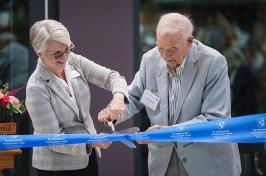
Students in the communication sciences and disorders program in the College of Health and Human Services have access to new audio equipment in the listening lab made possible in part by donor funds. The equipment makes a difference in the classroom and in the Speech-Language-Hearing Center, where students work with child and adult clients.
Students in UNH’s communication sciences and disorders program have the benefit of utilizing state-of-the-art audio recording equipment in the College of Health and Human Service’s (CHHS) recently established listening lab, a resource made possible in large part by gifts from donors.
Equipment in the lab enables the creation and analysis of high-quality recordings of speech and voice samples as well as the evaluation of hearing acuity, which student use as valuable tools in the classroom as well as in their work with child and adult clients in the university’s Speech-Language-Hearing Center clinic.
In that way, donors who give to the lab are making a direct impact not only on current UNH students but also members of the greater community.
“We have a huge amount of gratitude that we can directly apply these gifts. They don’t have to go through any hoops to become accessible or to make an immediate impact – what we need the most at the moment we can get to right away, and it benefits both students and our clinic clients,” says Laura Gonnerman, chair of the Center for Digital Health Innovation and the communication sciences and disorders program at UNH.
Students are able to use the recorded speech and voice samples to do acoustic analyses, which allow them to identify speech patterns in clients that might need to be addressed. As a library of samples is created, students can evaluate changes over time and chart a client’s progress. Being able to evaluate sound disorders in clinical situations and get hands-on experience transcribing speech are key skills, Gonnerman says.
The lab also features updated audiometer equipment, giving students tools to evaluate potential hearing issues, as well.
“One of the major components of our professional master’s program is hands-on training and experience, and since we do have an in-house clinic, a resource like the lab is very important to us,” says Gonnerman. “And for our undergraduates, it’s really valuable for them to have access to these tools before they go on to their career or to graduate school.”
The lab equipment also plays an important role in the classroom, as it gives students an opportunity to practice and work one-on-one with instructors before they are face-to-face with a client.
“High-fidelity recordings really help a lot in that area – when you’re looking for fine detail, it takes a long time to get that kind of trained ear,” she says.
Beyond scientific equipment, donor funds also allowed for the purchase of items like books and toys to keep children engaged while in the clinic. Gonnerman notes that CHHS was able to update the selection of those items to be “diverse and appropriate for a wide audience.” Gifts also helped create scholarships for students with demonstrated financial need, including those interested in working with children or adults in multicultural or bilingual situations.
Gonnerman says she has enjoyed developing a connection with some of the donors, who are able to visit the clinic and speak with students, capturing a tangible illustration of the impact of philanthropic gifts.
“It’s wonderful to mee the donors and see how excited they get when they are meeting the students if they have the chance,” she says. “I really enjoy that relationship with our donors – sometimes they are former students or people in the community, or people who have loved ones who have communication issues. It’s so valuable for us to be able to make those connections and reach out to the community in that way.”
Want to support the listening lab or any other area of UNH that means the most to you? Visit our giving page to explore all of your options to make a gift.
-
Written By:
Keith Testa | UNH Marketing | keith.testa@iin3d.com



















































